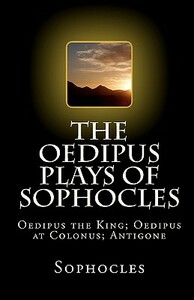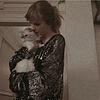Take a photo of a barcode or cover
551 reviews for:
The Oedipus Plays of Sophocles: Oedipus the King; Oedipus at Colonus; Antigone
Sophocles
551 reviews for:
The Oedipus Plays of Sophocles: Oedipus the King; Oedipus at Colonus; Antigone
Sophocles
42. Sophocles I : Oedipus The King; Oedipus at Colonus; Antigone (The Complete Greek Tragedies)
published: 1954 (my copy is a 33rd printing from 1989)
format: 206 page Paperback
acquired: May 30 from a Half-Price Books
read: July 3-4
rating: 4½
Each play had a different translator
- [b:Oedipus the King|13217761|Oedipus the King|Scott Hurley|https://d.gr-assets.com/books/1328691840s/13217761.jpg|18403656] (circa 429 bce) - translated by [a:David Grene|176021|David Grene|https://s.gr-assets.com/assets/nophoto/user/u_50x66-632230dc9882b4352d753eedf9396530.png] c1942
- [b:Oedipus at Colonus|148313|Oedipus at Colonus (The Theban Plays, #2)|Sophocles|https://d.gr-assets.com/books/1348287560s/148313.jpg|143129] (written by 406 bce, performed 401 bce) - translated by [a:Robert Fitzgerald|573688|Robert Fitzgerald|https://s.gr-assets.com/assets/nophoto/user/m_50x66-82093808bca726cb3249a493fbd3bd0f.png] c1941
- [b:Antigone|7728|Antigone (The Theban Plays, #3)|Sophocles|https://d.gr-assets.com/books/1428945528s/7728.jpg|1052210] (by 441 bce) - translated by [a:Elizabeth Wyckoff|1255584|Elizabeth Wyckoff|https://s.gr-assets.com/assets/nophoto/user/u_50x66-632230dc9882b4352d753eedf9396530.png] c1954
Greek tragedy can fun. After all those rigid [a:Aeschylus|990|Aeschylus|https://d.gr-assets.com/authors/1231954271p2/990.jpg] plays, that is the lesson of Sophocles. The drama within the dialogue is always dynamic, and sometimes really terrific. I had to really get in the mood to enjoy reading a play by Aeschylus, otherwise I might be bored by the long dull choral dialogues. These three plays are all different and all from different points in Sophocles career, but they each drew me on their own.
Although they are all on the same story line, they were not written together, or in story order. [b:Antigone|7728|Antigone (The Theban Plays, #3)|Sophocles|https://d.gr-assets.com/books/1428945528s/7728.jpg|1052210] was first, and was written when Sophocles was still trying to make a name for himself (vs Aeschylus). [b:Oedipus the King|13217761|Oedipus the King|Scott Hurley|https://d.gr-assets.com/books/1328691840s/13217761.jpg|18403656] came next, when Sophocles was well established. [b:Oedipus at Colonus|148313|Oedipus at Colonus (The Theban Plays, #2)|Sophocles|https://d.gr-assets.com/books/1348287560s/148313.jpg|143129] was apparently written just before Sophocles death, at about age 90. It wasn't performed until several years after his death. All this seems to show in the plays. [b:Antigone|7728|Antigone (The Theban Plays, #3)|Sophocles|https://d.gr-assets.com/books/1428945528s/7728.jpg|1052210] having the sense of an author trying to make a striking impression. [b:Oedipus the King|13217761|Oedipus the King|Scott Hurley|https://d.gr-assets.com/books/1328691840s/13217761.jpg|18403656] carrying the sense of a master playwright with it's dramatic set ups. [b:Oedipus at Colonus|148313|Oedipus at Colonus (The Theban Plays, #2)|Sophocles|https://d.gr-assets.com/books/1348287560s/148313.jpg|143129] is slower, and more reflective. And two of the main characters are elderly.
[b:Oedipus the King|13217761|Oedipus the King|Scott Hurley|https://d.gr-assets.com/books/1328691840s/13217761.jpg|18403656]
This is simply a striking play, from the opening lines. In line 8, Oedipus characterizes himself to children suppliants as "I Oedipus who all men call the Great." It shows his confidence, but, as Thebes is in the midst of a suffering famine, it also shows outrageous arrogance - it's the only clear sing of this in the play. He is otherwise a noble character throughout. Of course he doesn't know what's coming. In the course of the play he will learn, slowly, his own tragic story - that a man he had killed in a highway fight was his father, and that his wife, and mother of his four children is also his own mother. As each person resists giving him yet another dreadful piece of information, he gets angry at them, threatening them in disbelief at their hesitancy. His denial lasts longer than that of Jocasta, his mother/wife, who leaves the play in dramatic fashion herself, first trying to stop the information flow, and then giving Oedipus a cryptic goodbye. And even as his awareness gets worse and worse, he cannot step out of character, the show-off i-do-everything-right ruler, but must continue to pursue the truth to it bitter fullness.
[b:Oedipus at Colonus|148313|Oedipus at Colonus (The Theban Plays, #2)|Sophocles|https://d.gr-assets.com/books/1348287560s/148313.jpg|143129]
A mature play in many ways. It's slow, thoughtful, has much ambiguity, and has many touching moments. The opening scene is memorable, where a blind Oedipus moves through the wilderness only with the close guidance of his daughter, Antigone.
[b:Antigone|7728|Antigone (The Theban Plays, #3)|Sophocles|https://d.gr-assets.com/books/1428945528s/7728.jpg|1052210]
This play takes place immediately after what [a:Aeschylus|990|Aeschylus|https://d.gr-assets.com/authors/1231954271p2/990.jpg] covered in [b:The Seven Against Thebes|752713|The Seven Against Thebes|Aeschylus|https://d.gr-assets.com/books/1328866074s/752713.jpg|2474147]. Polyneices has attacked Thebes with his Argive army, and been repulsed by his brother Eteocles. Both are sons of Oedipus and they have killed each other in the battle. Creon is now ruler. He is a stiff ruler. Despite much warning, he refuses to listen to popular opinion, instead threatening it to silence (a clear political point is being made). But the problems start when he refuses to give his attacker Polyneices a proper burial. He threatens death on anyone who does try to bury him. Antigone openly defies this rule, setting up the play's drama. It's an extreme tragedy with a hamlet-like ending where practically everyone dies. I felt there was less here than in the other two plays, but yet there is still a lot. And it's still fun.
Overall
I don't imagine citizens of Thebes liked these plays. There is an unspoken sense of noble Athen poking fun its neighbor throughout. But, as it's not Athens, they give the playwright freedom to work in otherwise dangerous political points - and those are clearly there. But, mostly, these were fun plays. They don't need to be read as a trilogy. They were not meant that way, despite the plot-consistency. Each is independent. There are four more plays by Sophocles. I'm actually going to save them and start Euripides next. Because I think Sophocles is something to look forward to and that might push me through the next bunch.
published: 1954 (my copy is a 33rd printing from 1989)
format: 206 page Paperback
acquired: May 30 from a Half-Price Books
read: July 3-4
rating: 4½
Each play had a different translator
- [b:Oedipus the King|13217761|Oedipus the King|Scott Hurley|https://d.gr-assets.com/books/1328691840s/13217761.jpg|18403656] (circa 429 bce) - translated by [a:David Grene|176021|David Grene|https://s.gr-assets.com/assets/nophoto/user/u_50x66-632230dc9882b4352d753eedf9396530.png] c1942
- [b:Oedipus at Colonus|148313|Oedipus at Colonus (The Theban Plays, #2)|Sophocles|https://d.gr-assets.com/books/1348287560s/148313.jpg|143129] (written by 406 bce, performed 401 bce) - translated by [a:Robert Fitzgerald|573688|Robert Fitzgerald|https://s.gr-assets.com/assets/nophoto/user/m_50x66-82093808bca726cb3249a493fbd3bd0f.png] c1941
- [b:Antigone|7728|Antigone (The Theban Plays, #3)|Sophocles|https://d.gr-assets.com/books/1428945528s/7728.jpg|1052210] (by 441 bce) - translated by [a:Elizabeth Wyckoff|1255584|Elizabeth Wyckoff|https://s.gr-assets.com/assets/nophoto/user/u_50x66-632230dc9882b4352d753eedf9396530.png] c1954
Greek tragedy can fun. After all those rigid [a:Aeschylus|990|Aeschylus|https://d.gr-assets.com/authors/1231954271p2/990.jpg] plays, that is the lesson of Sophocles. The drama within the dialogue is always dynamic, and sometimes really terrific. I had to really get in the mood to enjoy reading a play by Aeschylus, otherwise I might be bored by the long dull choral dialogues. These three plays are all different and all from different points in Sophocles career, but they each drew me on their own.
Although they are all on the same story line, they were not written together, or in story order. [b:Antigone|7728|Antigone (The Theban Plays, #3)|Sophocles|https://d.gr-assets.com/books/1428945528s/7728.jpg|1052210] was first, and was written when Sophocles was still trying to make a name for himself (vs Aeschylus). [b:Oedipus the King|13217761|Oedipus the King|Scott Hurley|https://d.gr-assets.com/books/1328691840s/13217761.jpg|18403656] came next, when Sophocles was well established. [b:Oedipus at Colonus|148313|Oedipus at Colonus (The Theban Plays, #2)|Sophocles|https://d.gr-assets.com/books/1348287560s/148313.jpg|143129] was apparently written just before Sophocles death, at about age 90. It wasn't performed until several years after his death. All this seems to show in the plays. [b:Antigone|7728|Antigone (The Theban Plays, #3)|Sophocles|https://d.gr-assets.com/books/1428945528s/7728.jpg|1052210] having the sense of an author trying to make a striking impression. [b:Oedipus the King|13217761|Oedipus the King|Scott Hurley|https://d.gr-assets.com/books/1328691840s/13217761.jpg|18403656] carrying the sense of a master playwright with it's dramatic set ups. [b:Oedipus at Colonus|148313|Oedipus at Colonus (The Theban Plays, #2)|Sophocles|https://d.gr-assets.com/books/1348287560s/148313.jpg|143129] is slower, and more reflective. And two of the main characters are elderly.
[b:Oedipus the King|13217761|Oedipus the King|Scott Hurley|https://d.gr-assets.com/books/1328691840s/13217761.jpg|18403656]
This is simply a striking play, from the opening lines. In line 8, Oedipus characterizes himself to children suppliants as "I Oedipus who all men call the Great." It shows his confidence, but, as Thebes is in the midst of a suffering famine, it also shows outrageous arrogance - it's the only clear sing of this in the play. He is otherwise a noble character throughout. Of course he doesn't know what's coming. In the course of the play he will learn, slowly, his own tragic story - that a man he had killed in a highway fight was his father, and that his wife, and mother of his four children is also his own mother. As each person resists giving him yet another dreadful piece of information, he gets angry at them, threatening them in disbelief at their hesitancy. His denial lasts longer than that of Jocasta, his mother/wife, who leaves the play in dramatic fashion herself, first trying to stop the information flow, and then giving Oedipus a cryptic goodbye. And even as his awareness gets worse and worse, he cannot step out of character, the show-off i-do-everything-right ruler, but must continue to pursue the truth to it bitter fullness.
[b:Oedipus at Colonus|148313|Oedipus at Colonus (The Theban Plays, #2)|Sophocles|https://d.gr-assets.com/books/1348287560s/148313.jpg|143129]
A mature play in many ways. It's slow, thoughtful, has much ambiguity, and has many touching moments. The opening scene is memorable, where a blind Oedipus moves through the wilderness only with the close guidance of his daughter, Antigone.
...It's interesting to see Creon, Jocasta's brother, turn bad. But it's more interesting to see Oedipus have a bitter side to him. He maintains his noble character, and that is the point of the play—he is hero because he never did anything bad intentionally, and yet he bears full punishment. But he also makes some interesting calls, essentially setting up a future war between his Thebes and Athens. And, Antigone is striking too. She saves Oedipus critically several times through her advice or her speech. While sacrificing herself and maintaining real affection for Oedipus, she is also shrewd, stepping forward boldly and changing the atmosphere.
Who will be kind to Oedipus this evening
And give the wanderer charity?
Though he ask little and receive still less,
It is sufficient:
Suffering and time,
Vast time, have been instructors in contentment,
Which kingliness teaches too.
But now, child,
If you can see a place we might rest,
...
[b:Antigone|7728|Antigone (The Theban Plays, #3)|Sophocles|https://d.gr-assets.com/books/1428945528s/7728.jpg|1052210]
This play takes place immediately after what [a:Aeschylus|990|Aeschylus|https://d.gr-assets.com/authors/1231954271p2/990.jpg] covered in [b:The Seven Against Thebes|752713|The Seven Against Thebes|Aeschylus|https://d.gr-assets.com/books/1328866074s/752713.jpg|2474147]. Polyneices has attacked Thebes with his Argive army, and been repulsed by his brother Eteocles. Both are sons of Oedipus and they have killed each other in the battle. Creon is now ruler. He is a stiff ruler. Despite much warning, he refuses to listen to popular opinion, instead threatening it to silence (a clear political point is being made). But the problems start when he refuses to give his attacker Polyneices a proper burial. He threatens death on anyone who does try to bury him. Antigone openly defies this rule, setting up the play's drama. It's an extreme tragedy with a hamlet-like ending where practically everyone dies. I felt there was less here than in the other two plays, but yet there is still a lot. And it's still fun.
Overall
I don't imagine citizens of Thebes liked these plays. There is an unspoken sense of noble Athen poking fun its neighbor throughout. But, as it's not Athens, they give the playwright freedom to work in otherwise dangerous political points - and those are clearly there. But, mostly, these were fun plays. They don't need to be read as a trilogy. They were not meant that way, despite the plot-consistency. Each is independent. There are four more plays by Sophocles. I'm actually going to save them and start Euripides next. Because I think Sophocles is something to look forward to and that might push me through the next bunch.
tense
medium-paced
Plot or Character Driven:
Character
Strong character development:
No
Loveable characters:
Yes
Diverse cast of characters:
No
Flaws of characters a main focus:
Yes
antigone is my queen but unfortunately oedipus is just not it
dark
emotional
tense
fast-paced
reflective
medium-paced
Plot or Character Driven:
A mix
adventurous
challenging
dark
emotional
sad
tense
fast-paced
Plot or Character Driven:
Character
Strong character development:
Yes
Loveable characters:
Complicated
Diverse cast of characters:
No
Flaws of characters a main focus:
Yes
The Oedipus Cycle (or Three Theban Plays as they are called here) is a collection of plays by Sophocles, written in the 5th century BC. The cycle is nothing short of a masterpiece. The cycle revolves around the family of the King of Thebes, Oedipus, and begins with a plague devastating the city. The plague, according to a prophet of Apollo, can only be broken once the murderer of the old King, Laius, is discovered and promptly removed from the city.
Thus begins Oedipus’ quest to discover the murderer, and in doing so, sets himself up for destruction. Oedipus Rex is by far the greatest of these plays in that it contains the most tragic conclusion; the fall of a proud and beloved man transforming him into a monster of prophesy and a wretched being who is seen with both pity and disgust.
Though through these plays there comes to develop a tragic end for all of those in the family of Oedipus, it is not him alone who is cursed. It is this extension which is viewed in the other two plays. The second play, Oedipus at Colonus, is a gateway between the fallout in Antigone and the tragic conclusion of Oedipus Rex. The fall of the two sons of Oedipus is set up, along with the demonstration of Creon’s tyrannical nature.
Antigone is the finale in which all that could have remained for the family of Oedipus crumbles into nothing more than the dead and ashes.
Throughout these works it is clear enough to see reflections. A prime example of that is Oedipus’ fall being due to no fault of his own showing that there is no moral of the story, but rather it is only a tragedy of destiny. This is reflected with Creon’s fall being due to his moral failures, being too proud of himself and not willing to appear weak but in so losing all that he loves and becoming weak. A second reflection being that the cycle begins with a plague and ends in the prevention of another.
There certainly is much in this cycle which I will look into further and with great anticipation.
Thus begins Oedipus’ quest to discover the murderer, and in doing so, sets himself up for destruction. Oedipus Rex is by far the greatest of these plays in that it contains the most tragic conclusion; the fall of a proud and beloved man transforming him into a monster of prophesy and a wretched being who is seen with both pity and disgust.
Though through these plays there comes to develop a tragic end for all of those in the family of Oedipus, it is not him alone who is cursed. It is this extension which is viewed in the other two plays. The second play, Oedipus at Colonus, is a gateway between the fallout in Antigone and the tragic conclusion of Oedipus Rex. The fall of the two sons of Oedipus is set up, along with the demonstration of Creon’s tyrannical nature.
Antigone is the finale in which all that could have remained for the family of Oedipus crumbles into nothing more than the dead and ashes.
Throughout these works it is clear enough to see reflections. A prime example of that is Oedipus’ fall being due to no fault of his own showing that there is no moral of the story, but rather it is only a tragedy of destiny. This is reflected with Creon’s fall being due to his moral failures, being too proud of himself and not willing to appear weak but in so losing all that he loves and becoming weak. A second reflection being that the cycle begins with a plague and ends in the prevention of another.
There certainly is much in this cycle which I will look into further and with great anticipation.
I read this for a humanities course; we read all three plays. These translations are the best and my favorite that I have seen. The plays themselves were interesting and worth a read.
dark
fast-paced
adventurous
challenging
dark
emotional
reflective
sad
tense
medium-paced
Plot or Character Driven:
Plot
Strong character development:
No
Loveable characters:
No
Diverse cast of characters:
No
Flaws of characters a main focus:
Yes






